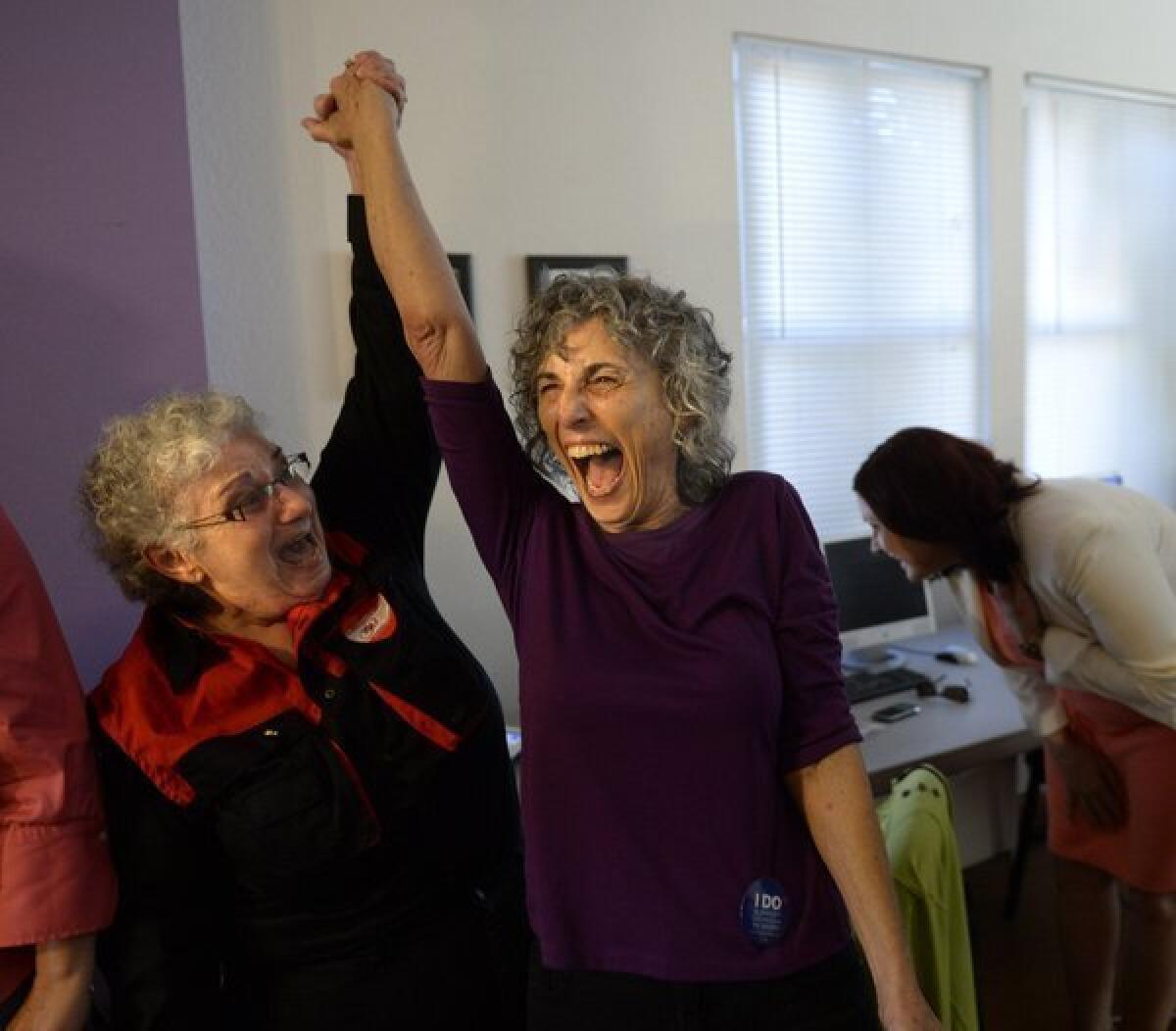Reactions to DOMA, Prop. 8 rulings from left, right and center

- Share via
Ten years to the day after the Supreme Court struck down anti-sodomy laws, the court opened the door to marriage equality Wednesday by striking down a key part of the federal Defense of Marriage Act and paving the way for same-sex weddings in California.
Like many gay marriage supporters, Andrew Rosenthal of the New York Times sounded a cautiously optimistic note. He celebrated the landmark ruling from a generally conservative court, but wrote that the country’s work isn’t done:
The rulings today leave a lot unsettled, starting with the fact that the surviving part of D.O.M.A. frees states from having to recognize marriages legally performed in other states — which seems clearly unconstitutional to me but was not part of this case. So, if you’re a same-sex couple married in New York and you’re driving west through the Lincoln Tunnel, when you see that yellow line marking the border of New Jersey, you’re no longer married. How ridiculous. (The New York Times)
The New Republic’s Jonathan Cohn agreed, but he argued that the language chosen by the court’s majority creates a framework for fuller equality. Technical hurdles remain, but the sense that we’re heading toward universal recognition for gay marriage isn’t an illusion:
Legal experts I consulted think the decision may create a legal principle (and political momentum) that advocates for same-sex marriage can use across the country, particularly in states that have so far resisted same-sex marriage. “The decision is formally limited to marriages that states have recognized, and the court’s discussion has undoubted federalism overtones,” says Sam Bagenstos, a constitutional law professor at the University of Michigan. “But Justice Kennedy’s majority opinion explicitly grounds the decision in equal protection, not federalism, principles, and the opinion is full of language and reasoning that lay a roadmap for constitutional marriage equality in all 50 states.” (The New Republic)
Critics on the right aren’t so happy about that prospect. Writing at the National Review Online, Ryan Anderson expressed dismay that California’s decision not to defend Proposition 8 prevented the law from getting a full legal hearing. He also complained that “the court got it wrong” on DOMA by overstepping Congress’ authority to pass laws:
The court ignored the votes of a large bipartisan majority of members of Congress. It is absurd for the court to suggest that Congress does not have the power to define the meaning of words in statutes that Congress itself has enacted. (National Review Online)
The Nation’s Ari Berman asks where that limited view of the court’s powers was Tuesday when it tore down the Voting Rights Act:
That reasoning didn’t stop Justices Roberts and Scalia from striking down the centerpiece of the Voting Rights Act yesterday, a hugely important civil rights law that has been passed by Congress five times with overwhelming bipartisan approval. Why didn’t the court defer to Congress on the VRA, which has a far more robust congressional history/mandate than DOMA? (The Nation)
Conservative New York Times columnist David Brooks called the decision a bold wake-up call to politicians who thought they could take it slowly on gay marriage: “The lesson is don’t try to be too clever. Go with your conscience or history might just run you over.”
For some, the ruling represents the climax of a decades-long struggle. Andrew Sullivan, a blogger whose 1989 essay making a conservative case for gay marriage helped transform the public conversation, wrote Wednesday that Justice Anthony M. Kennedy’s opinion moved him to tears:
It is the most liberating feeling to hear your once near-solitary voice blend finally into a communal roar until it isn’t your voice at all anymore. It’s the voice of justice.
We will all pass away (and so many dreamed of but didn’t live to see this day). Justice won’t. (The Dish)
ALSO:
Proposition 8: Kind of a victory
Clarence Thomas and the gospel of colorblindness
Roberts to Congress: We warned you about voting rights
Twitter: @benjmueller
More to Read
A cure for the common opinion
Get thought-provoking perspectives with our weekly newsletter.
You may occasionally receive promotional content from the Los Angeles Times.









